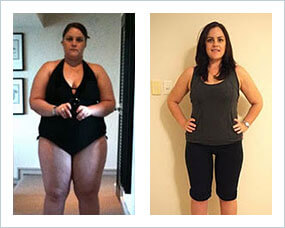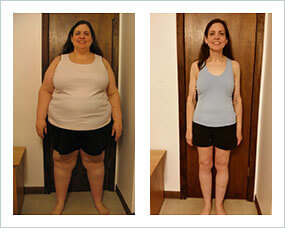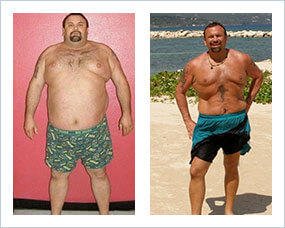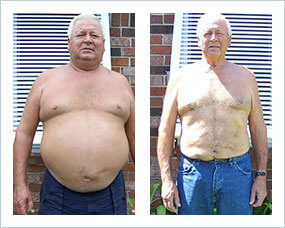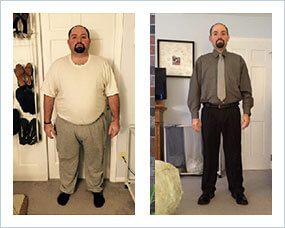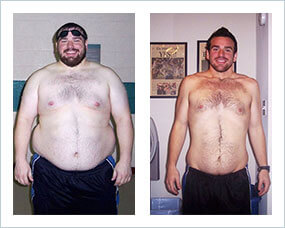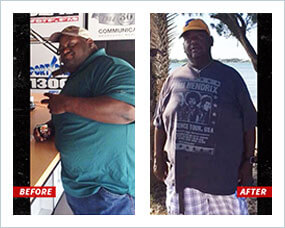During your gastric sleeve recovery, you can expect:
- Timeline: 4 to 6 weeks to full recovery
- Hospital Stay: 1 to 3 days
- Time Off Work: 1 to 3 weeks
- Pain: Same as experienced after any laparoscopic surgery, managed with medication
- Diet: Slow transition from clear liquids to solid foods
- Activity: Slow transition back to regular activity and exercise
- Challenges: Most side effects like nausea, digestive issues, and body changes go away over time or after adjusting diet/lifestyle habits
Read below for more information about each aspect of gastric sleeve recovery.
TABLE OF CONTENTS
Click on any of the topics below to jump directly to that section
- Recovery Timeline
- Incision Care
- Pain During Recovery
- Diet During Recovery
- Activity During Recovery
- Challenges During Recovery
- Patient Community & Expert Advice
- Find a Gastric Sleeve Surgeon

Before and after weight loss success
Individual results may vary
SECTION SUMMARY:
- You will be "fully recovered" in 4 - 6 weeks
Enhanced Recovery After Surgery (ERAS)
Patients who use the enhanced recovery after surgery (ERAS) protocols included on this page have (3)(4):
- 1 day shorter hospital stay, on average
- Lower costs
- Possible lower risk of complications
Before moving forward with surgery, ask your surgeon if they are familiar with ERAS gastric sleeve recovery protocols. Share this link if they are not, and note that this page adds to the protocols based on additional best practices.
Q & A: Recovery Time for Gastric Sleeve Surgery
How long is recovery from gastric sleeve surgery (gastric sleeve post op recovery)?
- 4 to 6 weeks
How long is the average gastric sleeve hospital stay?
- 1 to 3 days
- Some surgeons allow you to return home on the same day as surgery. This practice isn’t common and the surgery must be completed without complications. If you’d prefer to recover at home, ask your surgeon if this option is available.
At what point during my VSG surgery recovery time can I start eating food?
The recommended time varies by surgeon, but a conservative estimate is:
- 1 week: Start thicker drinks and smooth foods
- 2 weeks: Slowly test pureed foods and soft solid foods
- 3 weeks: Slowly test solid foods
How long is gastric sleeve recovery time off work?
- 1 to 3 weeks
How long does it take the stomach to heal after gastric sleeve surgery?
- About 2 weeks for incisions to heal
- About 6 to 8 weeks for stomach staple line to heal
When can I start heavy lifting and normal exercise?
- 4 to 6 weeks
When will I start to notice weight loss?
- Within the first week or two
- By month 3, the average sleeve patient has already lost about one-third of their excess weight
When are the follow-up appointments with my surgeon?
- 4 days and 1 week post-op: Phone appointment
- 2 weeks post-op: In-person appointment
When can I start driving again after gastric sleeve surgery?
- 1 week post-op, as long as you are off your prescription pain medications
SECTION SUMMARY:
- Keep the incisions clean (instructions below)
- Watch out for "warning signs" around your incisions to make sure you're not suffering from a serious side-effect (details below)
- You can do things to minimize your scarring (see below)
During your gastric sleeve recovery, do not rush back into your normal daily routine, and don’t lift anything heavy for at least a few weeks. Having sex is okay as soon as you feel up to it, but be extra careful with your healing incisions.
Incision Cleaning Instructions
Keep your incisions clean and covered by:
- Gently washing them with soap and water (no scrubbing or soaking)
- Air dry them or pat dry with a clean towel
- Dress the incisions with sterile bandages/wound dressing
Warning Signs
Swelling, bruising, and leaking a little bloody fluid is normal. But contact your surgeon if you see any of the following warning signs during your gastric sleeve recovery:
- Bright red skin
- Excessive leaking
- Leaking fluid changes color or thickness
Minimize Scarring
After the wounds have completely closed (usually takes about 2 weeks), use the following tips to finish the healing process and minimize scarring:
- Apply special lotions to minimize the scarring
- Use sunscreen on your scars when they are exposed to the sun
See our Gastric Sleeve Scars page for more information.

SECTION SUMMARY:
- You'll manage your pain with IV, prescription, and over-the-counter medication
- The pain will be completely gone in 2 to 3 weeks after surgery
The pain experienced during gastric sleeve recovery is similar to what you would experience after any laparoscopic surgery (surgery with small incisions):
- In-hospital: Right after surgery, pain will be controlled with IV pain medication. You will probably have the ability to “self-administer” your meds as needed by pressing a button.
- 1st week home: After you leave the hospital, you’re pain will be managed with prescription pain meds
- 2nd week home: After the first week, pain should have subsided enough for you to switch to over-the-counter pain medicine like Tylenol.
- 3rd week home: Your pain should be mostly gone. Continue over-the-counter meds as needed.
SECTION SUMMARY:
- You'll slowly transition from liquids to solids (details below)
- You'll also have to monitor your water & other fluid intake (guidelines below)
Your diet during gastric sleeve recovery will start with clear liquids and slowly transition back to solid foods. However, the speed at which you will transition varies widely by surgeon. Click below to learn more.
Diet Transition Schedule
Conservative Diet Transition
- Day 1: Nothing to eat or drink
- Days 2 through 7: Clear liquids only
- Week 2: Add thicker drinks & smooth foods (no chunks)
- Week 3: Slowly test pureed & soft solid foods
- Weeks 4+: Slowly test solid foods
Aggressive Diet Transition
- Day 1: Start clear liquids and possibly test thicker drinks and smooth foods (no chunks)
- Day 2: Test pureed & soft solid foods
- Day 3: Test solid foods
Talk with your surgeon to find which gastric sleeve diet transition schedule they recommend.
See our Gastric Sleeve Diet Page for more information about what you will eat after surgery.
Water & Fluid Guidelines During Recovery
It is important that you drink a lot of fluids during your gastric sleeve recovery – between 48 and 64 ounces per day. That’s equal to about 8 cups or 1/2 a gallon. You may find this tough to keep up with considering the smaller size of your stomach.
Use these tips to keep your water intake up and prevent problems:
- Keep a low-calorie drink next to you and sip a little every 15 to 20 minutes
- Designate a special container, measure out your daily amount of fluids every morning and put it in the fridge. Spread your consumption throughout the day so that the container is empty before you go to bed.
- Do not drink any liquids during your meals or within an hour afterwards. This can flush your meals through your new stomach which can cause you to eat more and contribute to vitamin deficiency.
Not just water!
If you only drink water, you may develop electrolyte abnormalities such as water intoxication syndrome. Make it a point to mix in low-calorie liquids such as unsweetened, caffeine-free herbal tea.
Talk with your team for recommendations specific to you, but most patients are instructed to limit water to no more than half of all fluid intake.

SECTION SUMMARY:
- You'll transition from just walking to more intense activity (see below)
It will take anywhere from 4 to 6 weeks to transition back to normal activity after gastric sleeve surgery.
- Day 1: Start simple movements, leg, and breathing exercises as soon as possible: sit up, hang your feet off the bed, and stand.
- Day 2: Start walking
- Day 5: Start light physical activity (lift no more than 10 lbs./4.5 kg), and start taking showers or baths (no hot tub or jacuzzi)
- Day 7: Start driving
- Day 14: Can start using hot tub or jacuzzi
- Weeks 4 to 6 (depends on patient): Back to normal daily activities and exercise, including heavy lifting
SECTION SUMMARY:
- Many people suffer from nausea after gastric sleeve surgery (it goes away)
- Many people suffer from digestive Issues after gastric sleeve surgery
- Your body can change in ways you weren't wanting or expecting (see below)
Most side effects experienced during your gastric sleeve recovery typically go away over time or after you adjusting your diet or lifestyle habits.
Possible sleeve gastrectomy recovery challenges include:
- Nausea or vomiting – After your stomach is fully healed, you’ll quickly learn what it can and can’t handle. How you eat is as important as what you eat when it comes to preventing nausea and vomiting… avoid eating and drinking too quickly or too much, take small bites and chew your food thoroughly.
- Body aches should pass with time. If they become too uncomfortable, talk with your doctor about which pain relievers are safe. You should typically avoid NSAIDs (non-steroidal anti-inflammatory drugs) such as ibuprofen or Aleve.
- Emotional difficulties – Your emotional state may be a little shaky during your gastric sleeve recovery time. It’s common for patients to feel scared, uncertain, or moody due to hormonal changes and to the emotional effects of adjusting to a new life after weight loss surgery. See the Help & Support section below for more information about how to handle these challenges.
- Weak or tired feeling – Most likely the result of your body healing and adjusting to less food. It should pass with time, especially once your new bariatric diet is in place and, as soon as you are feeling up to it, begin your exercise program.
- Feeling cold – this is caused by metabolism and weight loss and the fact that you have less fat insulating your body.
- Constipation – drinking more fluids, eating fibrous foods or taking fiber supplements and moving around regularly should help.
- Diarrhea or loose stools – usually diet related and requires the avoidance of “trigger” foods that disagree with your stomach.
- Gas – also diet-related.
- Gurgling noises – not necessarily uncomfortable, but it’s worth noting. Gurgling noises are completely normal and are due to the different way your smaller gastric sleeve stomach pushes air through. The best way to prevent gurgling noises is to avoid swallowing air (i.e. avoid carbonated beverages, sipping through a straw, eating or drinking too quickly and chewing gum).
- Hair loss – this can be an alarming side effect of rapid weight loss, but it is only temporary. It happens in about half of all patients in the year following surgery. Proper nutrition is the best defense, including protein and the right bariatric vitamins. Several other treatments can also help, including the application of special shampoos and oils (Nioxin shampoo, flax seed oil, biotin tablets or powder).
- Skin changes such as acne or dry skin occur with some patients. The right bariatric diet and bariatric vitamins are your best defense. There are also many over the counter creams and lotions that can help. Worst case, partner with your dermatologist to find a treatment that works.
- Thrush (yeast infection) – this can be a side effect of the antibiotics you are on to prevent infection. Symptoms include changes to your tongue such as a white coating, redness or inflammation. Thrush is easily cured with medicine, so let your doctor know if it starts to develop.
Between two and six weeks of gastric sleeve recovery time will need to pass before you start feeling balanced and “back to (your new) normal”. For the full list of potential issues, see our Gastric Sleeve Complications page.

SECTION SUMMARY:
- Support groups
- Ask the expert
- Patient experiences
Questions From Other Visitors*
Click below to see contributions from other visitors to this page.
I am scheduled for weight loss surgery and want to know if I’ll need to take medications after gastric sleeve? What about pain medications? Are opiates usually prescribed after surgery?…
SECTION SUMMARY:
- You can ask a local bariatric practice for a free insurance check or cost quote
- You can attend a free in-person seminar or an online webinar offered by a local weight loss surgeon
- You should schedule a phone or in-person consultation (both often free), if you are interested in learning more about weight loss surgery



